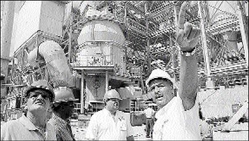Carib Cement books $371-million 3Q loss - Jamaican sales derail as exports bloom
Published: Wednesday | November 4, 2009

Brett Johnson, manufacturing manager of Caribbean Cement Company, points out an unseen feature of the upgraded cement kiln and mill to Delroy Christie of the Blockmakers Association of Jamaica during a tour of Caribbean Cement's upgraded Rockfort, Kingston, plant. Christie's colleague, Tony Charley, is at second left while Carib Cement General Manager Anthony Haynes is in the background. The company arranged the tour to show off its new production line for Ordinary Portland Type 1 cement and modernised plant on Wednesday, October 7. - Rudolph Brown/Photographer
The Jamaican cement market continues to underperform, but Caribbean Cement Company Limited (CCCL) made up for the 62,000-tonne shortfall in domestic sales in the nine-month period ending September 30, 2009 from a 13-fold growth in exports, largely clinker - just enough to eke out a slight gain in revenue.
For the third quarter, however, sales revenue was relatively flat, leading to a huge operating loss of $372 million, which was 830 per cent the comparative July-September 2008 period's $40 million operating loss.
It was just over two months ago that the company confessed publicly in a stock market filing that it could not meet its August paybill on time, citing cash flow constraints, but said the delay would have been only three days.
Its current cash flow position, showing negative cash of $83 million at September 30, has worsened relative to yearend December 2008's outcome of negative $10 million, but improved compared to September 2008's negative $183 million.
Precarious position
And CCCL's working capital position also remains somewhat precarious, with current assets of $3 billion barely covering short-term liabilities of $2.9 billion.
The company expects no real improvements short term in the Jamaican market, which is feeling the brunt of the ongoing recession, but sees some hope in growing overseas sales in the final quarter.
"It is anticipated that the domestic market will remain soft for the remainder of the year," said the company in a statement appended to the nine-month earnings report, "but there are encouraging signs that our efforts to sell into new export markets are achieving some measure of success."
To boost sales, CCCL has launched a '$40-off' sale per bag of cement (see story on Page C4), and the company is also fighting to reclaim 100 per cent of the market from importers, who have a 15 per cent share, courtesy of the duty waiver temporarily in place.
Caribbean Cement and parent TCL Group of Trinidad are fighting the re-imposition of the waiver, which officially expired September 9.
A decision is pending from CARICOM on whether Jamaica can suspend the 15 per cent Common External Tariff for another year, the industry ministry said Tuesday.
Carib's Cement's deterioration in the third quarter wiped away much of the gains in the previous two periods, but the company remained in positive territory for the nine-month period with $239 million operating profit (9M2009: $408m).
The cost of servicing the company's $5.2 billion debt load, however, as well as its continued exposure to foreign exchange risk, eliminated all operating gains at the bottom line.
The company booked charges of $374 million for debt servicing and foreign exchange losses in the January to September period.
"The fixed costs of the new kiln and mill now being charged to the profit and loss highlight the importance of optimising throughput for the company to achieve its profit potential," said chairman Brian Young and director Dr Rollin Bertrand in a director's statement to the stock market.
"The domestic market is 30 per cent below the productive capacity of the new plant ... exporting our excess capacity is critical if our inventories become filled and the new plant idle."
Third quarter slowdown
At the end of the nine months, the cement producer was $75 million in the red - compared to $215 million of profit in the 2008 period - the majority of which resulted from the third quarter slowdown, and the $291 million in losses booked for the three months.
Domestically, the company sold 496,183 tonnes of cement, a poor outcome relative to the 558,224 tonnes sold in the 2008 period.
And even while cement exports quintupled from 10,992 to 59,716 tonnes, it was not sufficient to grow overall volume sales for cement, which underperformed last year's sales by 13,317 tonnes.
Clinker exports rose from zero to 88,253 tonnes, which helped push revenue for the nine-month period up by $300 million, from $6.6 billion to $6.91 billion. Clinker is the precursor product to cement.
Explaining the performance, Young and Bertrand said the low sales were to be blamed on falling demand linked to an economy in contraction, but also low clinker production "that arose from challenges with the introduction of a new fuel mix - a problem now corrected."
lavern.clarke@gleanerjm.com

















